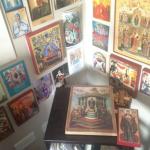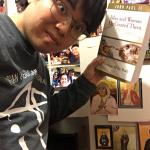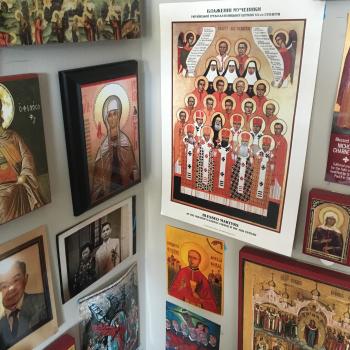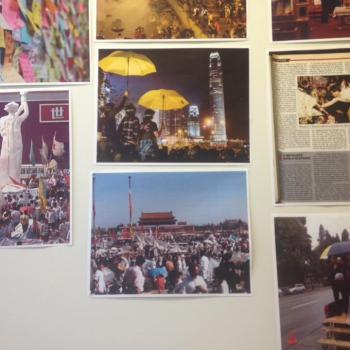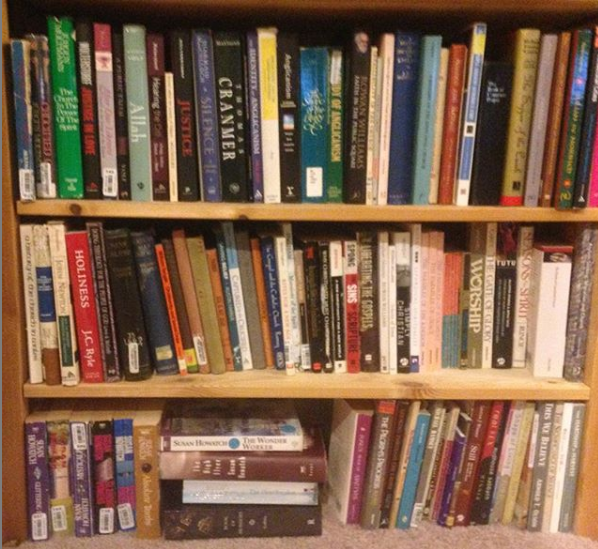
I first got the idea that I should receive spiritual direction around the time I was fifteen. I don’t think I really have ever publicly revealed this until last week, but I had read about it in Susan Howatch’s Church of England series, which had been recommended to my father in a conservative Baptist seminary’s Doctor of Ministry course on pastoral spirituality. Curious about what was advertised as a trashy exploration of the sex lives of Anglican clergy, I dove into the texts and got more than what I bargained for. I did not only get vividly described sex scenes, but also a Jungian understanding of the ‘big tent’ of Anglicanism among its ‘evangelical,’ ‘Anglo-Catholic,’ and ‘broad church’ camps.
I did not think when I was a high school sophomore that I’d actually become Anglican. I have indeed been rather ashamed till recently to reveal the truth of my first exposure to the Communion, which was, as I said a few days ago, through ‘Jung and jugs’ because it was literally through the Howatch books that I first got to know this world. Men in ‘Starbridge,’ as Howatch’s fictional parish is called, are oddly patterned only to enjoy sex with women with large breasts and remark on their disappointment with a kind of ‘iciness’ when they are small, a pattern that I do not know whether to attribute to Anglican male clergy, deep-rooted British fantasies more generally, or Howatch’s projection of what men like. I do know, and perhaps this has to do with my unexorcised Hong Kong imaginaries of how to be properly British, that Sean Connery had a ‘boob test’ for the women acting opposite him in the earliest of the Bond films. It’s probably why they all ended up looking the same after a while.
Indeed, over the years that I fell into and out of Anglicanism, a number of folks have recommended that I read Howatch. From their tone of voice, I can tell that they think of themselves as taking my Howatch virginity, though I often get the sense that they also thought that a pervert like me should be into them. Oh yeah, I’ve read those, I’ll casually say, to their great disappointment, as many of them think that they’ll be the ones who will usher me into the world of Starbridge. I never tell them that I literally think of the Church of England novels as source texts for both my theological and sexual development.
Sadly, it is also all too true. There is no way that a Chinese evangelical boy like me, growing up as I did going to a Pentecostal school and a non-denominational church, should have had any encounters prior to introductory theological studies with liberal and post-liberal names like Karl Barth, Paul Tillich, Charles Gore, William James, Michael Ramsey, J.A.T. Robinson, and Austen Farrer, much less familiarity with the terms spiritual direction, Anglo-Catholic, and psychic integration. But I did, and it was because I raided what I, with great sexual curiosity, thought would be my dad’s porn stash. I got far more than what I bargained for.
The most involved scenes in the book, as expected, are not the sex scenes. The intensity lies in the spiritual direction sections, which are also mostly about sex, usually because they are also very psychoanalytic. Here, Howatch’s powers as a Gothic romance novelist come into full display. Almost anticipating Anne Rice later on finding continuities between her vampire stories and the paranormal dimensions of Jesus’ life as she rewrites them, Howatch continues her method from her previous books, one of them literally titled Sins of the Father. The general idea is that what is done by one generation has ripple effects into the next, whether or not the children have any idea of what the parents or the grandparents have done. The transference here, in turn, gets a Jungian spin because the stories that Howatch tells can also be traced back into historical and mythological characters, like Antony and Cleopatra — or as in the Church of England series, into the various typologies of Anglican practice. There’s a collective consciousness that is cosmological for Howatch. Its pathways can run generationally, historically, and mythologically.
With such a framework, the task of spiritual direction in Howatch is to trace these psychic paths. Enter the Darrows, Jon the father and Nick the son. Jon is a monk in an Anglo-Catholic monastery, or was, until he discerns with a character that straight-up channels the psychologist of religion William James (which, to my embarrassment, is the truth of how I came to learn about James) that he should leave the monastery. In the first book Glittering Images, we meet Jon as that wise spiritual director at the monastery who is not only good at spiritual analysis, but is also spookily psychic in that he can literally read his directee’s mind. In the discussions leading up to leaving the monastery, we learn that Jon actually is psychic in the sense that he really can feel and read psychic waves, which is why the discussion of James and his books The Will to Believe and The Varieties of Religious Experience are so important. I was consumed by these fictional conversations when I was fifteen — they’re actually as far as I got in the second book then — and that was because they gave me a lot to think about. My friends do refer to me as psychic, and it is true that I can read non-verbal wavelengths. These passages gave me a kind of name for my pain.
In a fit of what he calls ‘Monk’s Madness’ (when former monks get out of the monastery and sleep with everyone and everything in sight, apparently), Jon Darrow winds up with Anne, a young woman with big boobs (surprise). Eventually, after having a lot of problems with sex — four hundred pages’ worth — they learn to do it right. Sexual union in turn produces a child, Nick, who is also a psychic. We meet Nick in full form in Mystical Paths, a book that I did not encounter until about eight years later, when I was finishing up my master’s degree in geography, fallen off ordination track in the Anglican Communion, and was putting my spiritual life back together. I liked him. He was also thinking of becoming an Anglican priest, and screwing it up royally by going out to town and sleeping around while pretending to have the perfect courtship with Rosalind, an ice blonde who is apparently skinny as a stick. Along the way, he also gets mixed up with a murder investigation that has to do with his friend, a closeted gay man killed for rebuffing a partner for a long term relationship, and of course, it’s not the police who get called, but another psychic, a guy whose last name is Lewis and whose daughter Rachel has big boobs. Examining cold spots where the ghost of the deceased still haunts the scene of the crime and desecrated churches where they have to say communion at every spot where the trail of the murder led, they solve the mystery, Lewis and Rachel take off, and Nick ends up with Rosalind, except in the sequel St Benet’s Series, which is about how Anglican parishes in London have reconceptualized themselves as postsecular service delivery sites for spiritual healing, they end up getting divorced, and Nick apparently ends up with someone else with big boobs (I never finished the book — only skipped to the end). He also becomes a spiritual director to high flying London professionals who get caught up in the organized crime syndicate called global city neoliberalism.
From the Darrow characters, I got the impression that spiritual direction was somehow related to dealing with my own psychic abilities. Somewhere in the mix, they discuss Padre Pio, a Latin saint who not only received the gift of the stigmata, but also was known to bilocate. Like Luke Skywalker in The Last Jedi, Jon manages a bilocation, to Lewis and Nick’s shock. The descriptions may have been fanciful, but I felt like I knew what they were talking about in a deeply personal way. In fact, it was why I wanted spiritual direction. I felt like they were usually out of control, and I couldn’t tell the difference between what I was feeling and what I was fantasizing about, or whether the nonverbal communications I had with other people were actually true to what they were feeling, or whether the situations I was moving through were actually real or happening in my own head. To me, there was something amazing about the gift of psychic discernment, and through the Howatch novels, I began to articulate it at least to myself as my own way of encountering the spiritual — hence the need for direction.
The only trouble is that psychic discernment, much less psychoanalysis, is not really what spiritual direction is designed to do. The Protestants who directed me — an Irish Protestant who had served in funeral services and children’s ministry for most of his career, a Presbyterian hospital chaplain who had recently retired from ministry, and even my own father, as well as my evangelical Anglican graduate supervisor, both of whom saw themselves in the capacity of some kind of spiritual mentor to me — were much too nice to tell me this. The Catholics were better, though they often denied me the pleasure of calling them spiritual directors. The Filipina nun that I often saw called herself my spiritual friend, and the creative writing mentor referred to me as brother. There is a passage in Mystical Paths of which this divergence often reminds me, where Lewis tells Nick that spiritual direction can happen in either Protestant or Catholic modes — they are Anglican, after all — but that the way that Nick had been formed was fundamentally Catholic. At the time, I took this to mean that Catholics were more attentive to psychic tendencies, which is why I desperately sought to get away from Protestantism as I had no room there to discern my abilities.
There is a reason that I became Eastern Catholic out of all of this stumbling around spiritual direction, and it’s my own story, which should not be a model for anyone else encountering our churches. The simple fact of the matter is that, after encountering spiritual direction at a political level by the Eastern Jesuit who directed our retreat on the Hong Kong Umbrella Movement, I asked him for spiritual direction, and he agreed to having regular spiritual conversations with me. Doing the spiritual exercises was not really an option for me — I had no time to do anything, really, outside of academia — but we took the situations of my everyday life and used them to discern consolations and desolations, the sense of the presence and absence of grace in a world that is fundamentally constituted by the supernatural. Eventually, these conversations turned into my catechumenate, and through them, I was received into the Kyivan Church.
But the point is that some of these conversations were also like pulling teeth. I had the impression that spiritual direction was about sorting out my psychic abilities, but my spiritual father was much more interested in how I felt connected with what was actually going on in my life. I wanted to talk about concepts and connections; he wanted to talk about relationships. I suppose that that’s how spiritual direction worked even in the Howatch novels, but I was not at a place where I could see that. In fact, the St Benet’s Series — which I suppose I’ll have to read now, and not just for the boobs — is structured around the work of the spiritual director David Ford in his book The Shape of Living, which was the Archbishop of Canterbury’s Lent book for 1997. There’s nothing psychic about that book either; it’s about modern people being overwhelmed with life and needing to discern the shape of their lives through their actual relationships, what matters to them in their work and leisure, and how all of these practices of everyday life are spiritual.
It was in one of those conversations, one that was well into my mystagogical journey within the Kyivan Church, that I finally had a breakthrough in my discernment of the psychic. Out of embarrassment at the end of a very fruitful session where we discussed the contours of my everyday life — I had finally gotten the hang of it — I confessed that I had things like premonitions and psychic connections, and I wasn’t sure about what to do about it. My spiritual father was very helpful. Drawing my attention back to consolations and desolations in my everyday life, he posited that my abilities were neither here nor there. Sometimes, I was even wrong about my predictions and predications. I may have extra-sensory perceptive capabilities, but they were just that — senses. There is nothing to discern about them. Situations can be discerned. Senses are just what we have to feel the world.
With that conversation, I felt a fog begin to lift. In being impressed with my own abilities, I had invested years, perhaps a decade and a half, into putting my psychic capabilities to use, and I was often confused when friendships failed, and romances soured, and collegial relationships broke down, all because a good deal of what I was doing was going on inside my own head. In fact, that had been one of the long-standing themes of these spiritual conversations, which meant that they were also themes of the catechumenate and mystagogy — that much of my life was lived in my head, and that phenomenon perhaps had many explanations, and that perhaps some of it had to do with my intellectual life as an academic, although it also really screwed me in terms of my writing because I’d try to write and what it felt like was a string of words coming from opposite me like an oncoming train crashing into me. Suddenly, it became clear to me what the problem was. It was not that I could not discern which psychic senses were worth following, which premonitions were worth pondering, and which voices in my head actually directed me. It was that they were all a distraction from everyday life and that spiritual realities, as well as the capacity to be conscious of them, are lived in that real world.
I don’t know what these reflections say about Howatch, and whether I’ve misread her on spiritual direction, or whether she herself is too obsessed with the psychic, or whether she and I have both grown in our respective journeys. But what I can say is that along this road of actually receiving spiritual direction, I’ve been taken out of my own head and re-situated in the body that goes about the practice of everyday life in the world. In fact, it’s no surprise to me that the person who wrote the book titled The Practice of Everyday Life was a Jesuit, Michel de Certeau SJ. Nor is it surprising to me that Certeau makes good use of Freud. To me, as in Howatch, there is a deep connection between spiritual direction and psychoanalysis, but the point of the psychic phenomenon is not to get caught up in obsessing over concepts and senses, but to actually live, understanding the transferences as part of what Freud called the ‘psychopathy’ of everyday life that should be analyzed — but as a part of the contours of concrete living. To have some level of extrasensory perceptive ability is part of that everyday life for me, as I suspect it is for a good many people such that it is not at all that impressive but rather ordinary, but the senses leave nothing to be discerned. Meanwhile, there is a whole world outside my head to be lived in. There I go every day.

